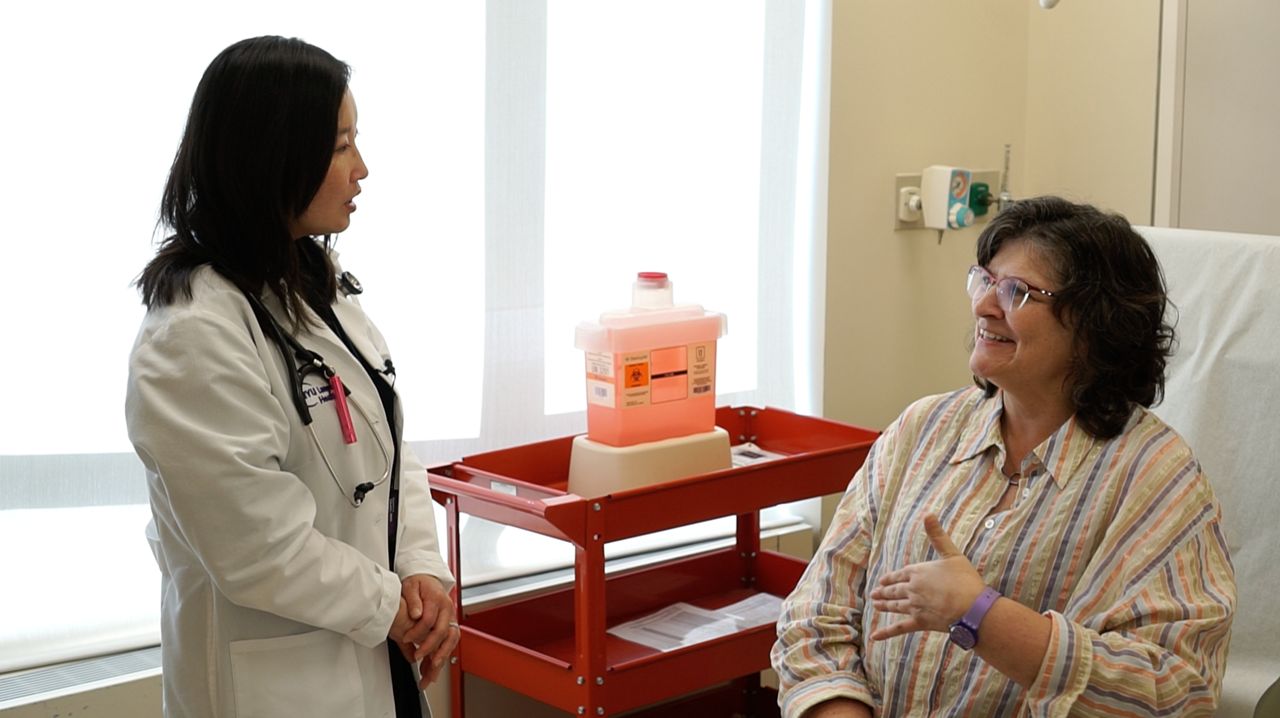The march toward curing cancer is long. Because there are many different types of cancers, each needs its own cure. Trial participants are needed to study every potential treatment. But as our National Health Reporter Erin Billups explains, playing a role in clinical trials in the best cases, can also greatly benefit those who take a risk by participating.
For Jennifer Farrell, a high school history teacher, her experiences are chronicled by current events.
“I think it was the day actually, that the Russians invaded Ukraine. It was the end of February,” said Farrell. “ The MyChart came through. I saw that I had the carcinoma. So that's how I found out I had breast cancer.”
It is a scary diagnosis for anyone, but particularly Farrell, her mother had died decades earlier of the disease. Shortly after, her older sister Liz Farrell was diagnosed with a hard to treat, triple negative breast cancer.
“She had all of the chemos that are there, like the really toxic ones. She had a bilateral mastectomy and she also had to have radiation,” said Farrell.
After consulting with doctors, Farrell was relieved to learn her own cancer was a very small, very treatable, stage one tumor. She then accepted an invitation to enroll in a clinical trial.
The study, I-SPY 2, is a platform trial, which explores the effectiveness of several different drug candidates based on the type and stage of a participants’ breast cancer.
NYU Langone’s Breast Cancer Clinical Research Director, Dr. Nancy Chan is leading that study.
“The I-SPY2 design allows for a short time period for novel therapeutics to be utilized in the early stage breast cancer setting, which otherwise we wouldn't have an opportunity to use and then very closely monitor patients by imaging to make sure they're not progressing and also assessing their response,” said Chan.
It is part of the shift away from blanket use of more severe toxic treatments. Instead, doctors are leaning toward more tolerable precision therapies, proving crucial for older or frail patients.
“The field now is moving towards dialing back on chemotherapy,” said Chan. “The treatment paradigm is changing. It's shifting.”

Farrell was randomized into a group that received antibodies attached to very small doses of chemotherapy. “That's what's called the conjugate, is a combination drug that only gets dispersed or released once the complex is swallowed up into the cancer cell,” said Chan.
As a result, Farrell experienced minor side effects during her year of treatment.
“I stayed home the next day because I had to manage the nausea,” said Farrell. “But then like 24 hours later, I'd feel like myself again and I would just go back to work and I would watch what I ate.”
Both Farrell said she and her sister Liz are grateful to be counted among the growing list of cancer survivors. Still, Farrell marvels at the differences in their treatment experiences.
“I had no hair loss, very limited neuropathy, cleared itself up,” said Farrell. “Even the ways that they told me, you know, if you keep your hands and feet in ice, you won't get neuropathy. You know, she didn't even know that. You know, she had neuropathy for ten years after her treatment.”
Before she started her treatment the clinical trial called for analysis of the genetic information of her tumor. This step allowed her early access to a therapy that was FDA approved for use in later stage cancer patients, not yet for stage one patients.
“I always explain to my patients that the clinical trial I'm introducing to you is, for the most part, trying to improve upon standard of care,” said Chan.
Farrell no longer has evidence of cancer, she opted to remove one breast, where a small tumor was found and continues to take an immunotherapy medication. She found the opportunity to play a role in efforts to find cures for cancer especially gratifying .
“Even if my cancer does return, my outcome is not great, that's still data that they're going to use down the line that will help other people,” said Farrell. “If you have cancer anyway, you might as well be doing something that's going to better it for the people that come after you. Right?”



